The Lester Entrepreneurial Scholars Program at The University of Texas at Austin College of Pharmacy is designed to prepare our students, in the professional and graduate programs, to develop entrepreneurial and innovative leadership and thinking skills to tackle healthcare issues in innovative new ways.
The program is open to The University of Texas at Austin College of Pharmacy Pharm.D. and Ph.D. students. Pharm.D. students must be in their first or second year of coursework.
Applications are now open. The deadline to apply for the program is Friday, April 26, at 11:59pm. Please email lesterscholars@austin.utexas.edu with any questions.
Goals
- Identify, nurture and promote entrepreneurship and innovation skills in student pharmacists and graduate students.
- Promote innovative ideas that improve patients’ lives.
- Develop and grow a sustainable program that offers continuity for students and ensures that projects go from concept to development.
Outcomes
- Capabilities - students utilize entrepreneurial thinking, innovation, and leadership to participate in developing new products and services.
- Capacity - facilities and tools for design, prototypes, experimentation and collaboration.
- Products and Services - the model for sustainability and continuity allows projects to progress with transitions of Lester Scholars.
Program Details
Program Tracks
The program consists of distinct tracks to help define the course of action to move a Scholar through the program.
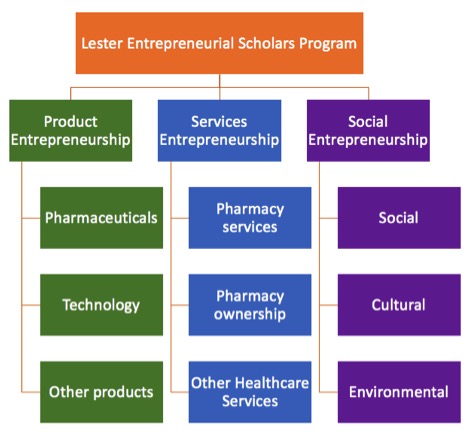
Product Entrepreneurship:
- Pharmaceutical products (including drugs and devices)
- Technological products (including software and apps)
- Other physical products (such as engineering related)
Service Entrepreneurship:
- Pharmacy and healthcare services (to implement within an operating pharmacy or another healthcare setting)
- Independent pharmacy ownership and related services. Learn more about the pharmacy ownership track here.
- Entrepreneurism and innovation within other healthcare organizations
Social Entrepreneurship:
- To develop and implement solutions to social, cultural, or environmental issues (including non-profit pharmacy services or other related non-profit healthcare ideas) that impact the health of society
Program Phases
Everyone in a program track will move through four distinct phases: Selection, Learning, Experiential, and Leadership. The timeline for the program will include 2 project milestones. These project milestones will help determine the progress and the future of each Scholar.
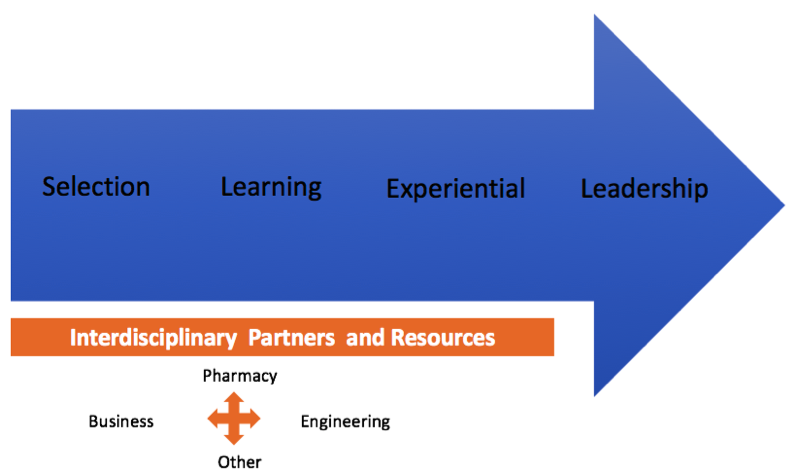
Selection:
The selection phase will repeat the process of the prior year. After the candidates submit an application and entrepreneurial proposal, feedback will be provided with an opportunity to resubmit for final consideration. The Scholars will then be selected for the program. At this point, the Scholars will select or be placed in teams to complete a project, if applicable. The project options are a unique idea proposed by a Scholar, a legacy project from a previous class of Scholars, or a Faculty proposed project that matches Scholar interests.
Learning:
The chosen Scholars will undergo an orientation session to set clear expectations of the program. Then the Scholars will be required to register for a practicum course. This course will guide them through the entrepreneurial process of creating a project plan, goals, determining resources, and creating milestones. Guiding the students through the various phases of the drug development process will give them important insights and information that they need for selecting a project and setting realistic goals and milestones.
During this phase, the Scholars will chose one or more external entrepreneurs who will serve as a mentor(s) for the Scholar’s ideas. At the end of the learning phase, the Scholars’ project plans will be reviewed. Mentors will be engaged in the review process. Upon successful review, the Scholars will be approved for the experiential phase of the program and receipt of a scholarship for support to allow the Scholar to focus on the next phase.
Experiential:
During this phase, the Scholars will initiate their project plans and will undergo bimonthly project reviews, bimonthly team to team reviews, apprenticeships or internships, and quarterly progress summary to steering committee. As the Scholars finish up the implementation of their projects, they will present the outcomes of the project in addition to a final written report.
Leadership:
As new Scholars are selected, outgoing Scholars increase their leadership skills by mentoring incoming Scholars.
Pharmacy Ownership
The Pharmacy Ownership track coincides with the Good Neighbor Pharmacy NCPA Pruitt-Schutte Student Business Plan Competition. Eligibility Requirements for the competition are:
- Teams must be composed of Doctor of Pharmacy (PharmD) students, all of whom must be active NCPA student members.
- Each team must have one (1) team advisor who is a pharmacist member of NCPA or who is a full-time faculty member at the pharmacy school.
- Pharmacy schools entering the competition must have an active NCPA Student Chapter. UT-NCPA is very active. NOTE: Only one application will be accepted per student chapter.
- If selected as finalists, team members (up to four) and the team advisor must be able to attend the NCPA Convention in October.
Students are also required to register for PHM 292G Pharmacy Business Planning in the Spring semester. This class meets from 9-11am on Thursday mornings and is intended to be a period of brainstorming, teamwork, and collaboration. Any student from any campus is eligible to be a part of the team.
In order to participate in the business plan competition, one must apply to the Pharmacy Ownership Track of the Lester Entrepreneurial Scholars Program. The application process for this track coincides with the PHM 292G course offering.
Previous Scholars
2018 Scholars
Pharm.D. Candidates:
- Adam Burkhard
- Alex Cantu
- Aaron Carabajal-Johnson
- Aisha Fowler
- Haben Tesfamariam
Ph.D. Candidate:
- Patricia Pereira Martins
2017 Scholars
Pharm.D. Candidates:
- Omar Fuentes
- James Cong
- Meghan Ha
- Sarah Nguyen
Ph.D. Candidates:
- Ashlee Brunaugh
- Xiujuan Peng
M.S. Fellow Candidate:
- Esther Yi
2016 Scholars
Pharm.D. Candidates:
- Austin Green
- Christian Carlson
About Michael Lester
A native of Pleasanton, Texas, Mike Lester became a Texas Longhorn pharmacist in 1979 when he earned his B.S. in pharmacy. Since then, he has distinguished his career with an entrepreneurial drive to deliver health care with innovation and efficiency.
His career includes 35 years in the multi-site health care services and pharmaceutical life sciences fields. Mike has successfully capitalized and assembled top tier management teams and implemented strategic and tactical business plans throughout his career. As a result, he has created long term value for employees, patients, and shareholders.
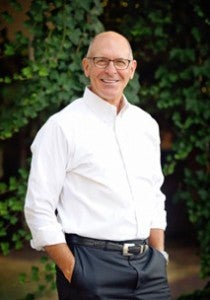
He was founder and CEO of:
- Accelecare Wound Centers, a comprehensive wound care and disease management company;
- Radiant Research, a comprehensive clinical research company providing Phase I-IV study conduct and drug development services to the biopharmaceutical industry; and
- ContinueCare Health Systems, a high tech home, and alternate site infusion therapy company.
He founded LifeStance Health, a behavioral health company, and served as a venture partner at Bain Capital and SV Life Sciences
Mr. Lester serves on The University of Texas College of Pharmacy Pharmaceutical Foundation Advisory Council; is a member of the Board of Directors of LifeStance Health, Inc., Ventec Life Systems, Inc.; and is a senior advisor to Silversmith Capital Partners. He was formerly a board member and president of the Texas State Board of Pharmacy.
Frequently Asked Questions
What is entrepreneurship?
Entrepreneurship involves having the ideas, initiative and and capacity to develop a new business venture that offers an innovative product, service or process that improves upon what already exists.
Why should I apply to this program?
The Lester Entrepreneurial Scholars Program is designed to prepare our students, in the professional and graduate programs, to develop entrepreneurial and innovative leadership and thinking skills to tackle healthcare issues in innovative new ways. The Lester Entrepreneurial Scholars will have access to a variety of resources, typically not available to students.
Who can apply to the program?
The program is open to College of Pharmacy Pharm.D. and Ph.D. students and is designed to foster entrepreneurial thinkers and leaders who have demonstrated entrepreneurial experiences. Pharm.D. students must be in their first or second year of coursework.
What counts as a gateway entrepreneurial experience?
There are many formal courses, both on and off campus, including Pharmaceutical Entrepreneurship (PHR261J/PHR280M), business school courses (Texas Venture Labs) and Engineering. In addition, employment and internships in an entrepreneurial/startup environment, such as the Austin Technology Incubator, would be considered. These are suggested experiences. The application review committee will be open to entrepreneurs who haven’t been able to complete a gateway experience, but who could complete one during the program.
If I have completed a previous internship, does that count as a gateway experience?
If the internship focused on entrepreneurship, it would be considered to qualify as the gateway experience.
Are grades an important consideration?
Successful applicants need to be academically sound; however, GPAs are not a critical element in the decision-making process.
Who reviews the applications?
A committee comprised of academic, business and entrepreneurial partners will review the applications and participate in the final selection of the Lester Entrepreneurial Scholars.
What are the criteria for selection?
The application centers around the applicant proposing the initiation of or continuation of an entrepreneurial project and the impact it will make on the patient experience and/or healthcare outcomes.
When does the program start, and how long does it last?
Each Lester Entrepreneurial Scholar will be given the flexibility in timing based on the scope the project, not to exceed their tenure as a student.
Can I receive credit hours for this?
Each of the selected Lester Entrepreneurial Scholars will enroll in an independent study course. In addition, a recipient may request for their project to be part of their P4 rotation. This would need to be approved in advance.
Is there any written report required by the recipients?
Yes, a written summary and/or presentation of the entrepreneurial experience will be expected at the conclusion of the experience.
Is there a financial stipend for recipients?
The Lester Entrepreneurial Scholars program is not a traditional internship; it is an entrepreneurial experience. Funds are available to support the proposed projects and could include travel.
What about Intellectual Property?
The University of Texas System Rule 90101: Intellectual Property, Sec. 6 Students and Intellectual Property, states:
A student enrolled at a U. T. System institution, such as in an undergraduate or graduate degree program or certificate program, including a postdoctoral and predoctoral fellow, owns the intellectual property he or she creates (a) in courses, (b) during extracurricular activities, and (c) while using the resources and facilities of U. T. System institutions commonly provided for a student’s use and for which a student has paid tuition and fees, unless:
6.1
The student is also an employee of the U. T. System or any U. T. System institution and the intellectual property is developed within the course and scope of his or her employment, in which case the provisions of this Rule relating to employees shall apply;
6.2
The student works on a work-for-hire or institutional project as described by Section 8, in which case Section 8 governs that work;
6.3
The student participates in a research project where any intellectual property created under that project has already been committed to, or encumbered by an agreement with, a governmental, philanthropic, corporate or other sponsors, including a sponsor as described in Section 12.1; or
6.4
The student jointly creates the intellectual property with a non-student, in which case this Rule (other than Section 6) and applicable law dictate ownership of the intellectual property as if the student was a non-student described in Section 3.
For More Information
Contact Us
Please direct questions to: lesterscholars@austin.utexas.edu.
Application Instructions
Download the application instructions for current students.
Applications are accepted in the Spring term of each year. We will update this page with specific dates and application deadlines.
Program Director - Pharmacy Ownership Track
-
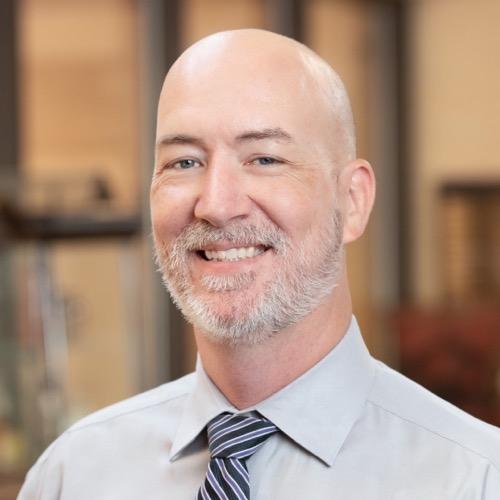
Terry Weaver, B.S., R.Ph.
Clinical Assistant Professor of Pharmacy PracticeCommunity Coordinator, Austin/Temple/Waco Region
Program Directors - Health Innovation Track
-
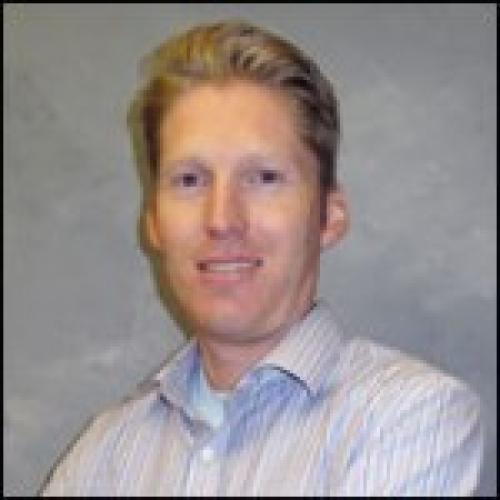
Hugh D. Smyth, Ph.D.
Professor of Molecular Pharmaceutics and Drug DeliveryAlcon Centennial Professor -
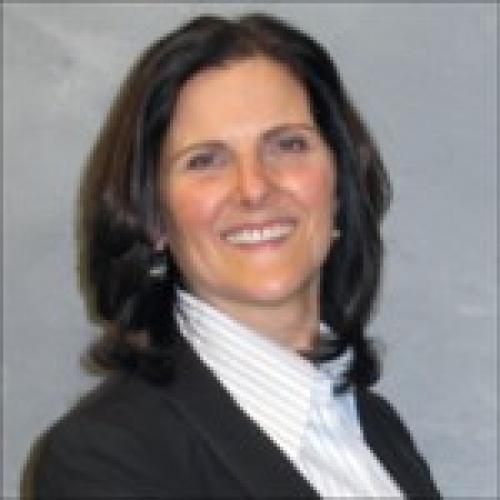
Janet C. Walkow, Ph.D.
Clinical Professor of Molecular Pharmaceutics and Drug DeliveryExecutive Director & Chief Technology Officer, Drug Dynamics Institute

